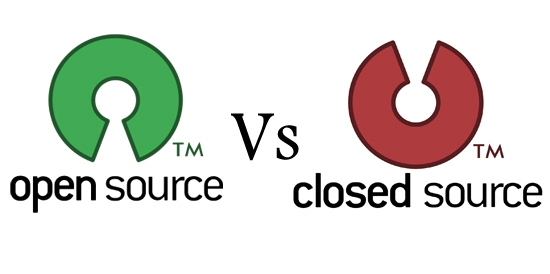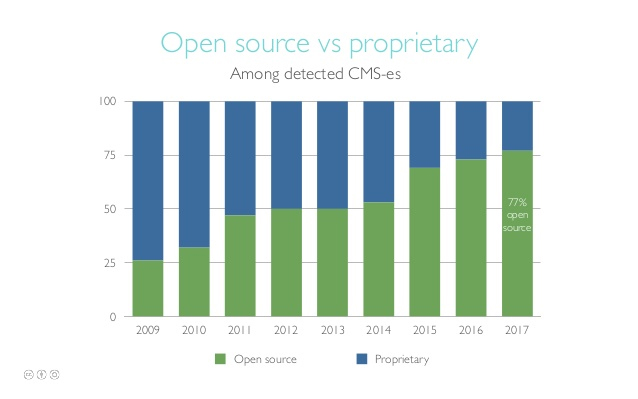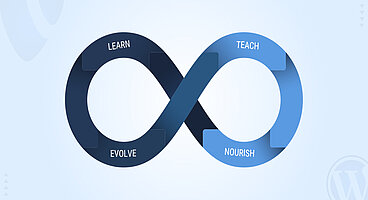So you want a new website and you need to choose a content management system (CMS)—a software platform that lets you easily manage and run your website. You’ve heard a lot about choosing an “open-source” CMS, but what does that even mean, and why should you care?
With our decade of experience with Open source CMS TYPO3, we constantly strive to contribute to the community.
At a fundamental level, open-source solutions are better than proprietary ones. Want to know why? Here are nine reasons why businesses and government organizations benefit from using open source technology
What is Open source CMS?
As you might be aware, open-source is vital for your organization when choosing between different CMSs. But exactly is open source? Okay, well Open source means that the source code of the CMS is available to everyone, which shows several benefits for you.
What is the Major difference between Open Source and Proprietary CMS?
Source: https://steemkr.com
As open-source CMS also has features exactly as the name implies: a source code open to the public eye and free to use by anyone with restrictions depending on the license type, with the most common being GPL and Apache.
Developers who create an open-source CMS publish the code and allow others to use and modify it. This might spawn a developer community, where programmers come together to develop the software and provide support to users.
Some of the more popular open-source CMS platforms you may have heard of are TYPO3, WordPress, Joomla, and Drupal.
As the name implies, a proprietary CMS is a software that is the legal property of an organization, group, or individual that created it.
The rights holder to the CMS will usually not release the source code to the public, and often only those who have purchased a special license key may use it.
Examples of proprietary content management systems or digital experience platforms are Adobe Experience Manager, Kentico, and Sitecore.
Open Source CMS Market Share
Source: https://twitter.com/wunderkraut_be
A content management system’s market share can tell you how popular it is among users, its expected growth, and how it compares to its competitors.
By monitoring changes in market share by year or even month, you can pinpoint which content management systems have continued to grow since their inception and which are on their way out.
As the above statistics speak for themselves, we can see that year by year people are opting for Open-source CMS rather than opting for Proprietary CMS. And why is that so? Grab a cup of coffee and read this blog to end!
Most Popular Open Source CMS
A simple definition of CMS - Content management systems allow the non-techies to create full-scale, working, professional-looking websites without digging into code. As simple it is to use, another cool thing is that nearly half of all of the 1,281,120,915+ websites online use a CMS, so you’re in good company.
Here is a glimpse of the 5 most popular CMS platforms by market share. Check them out!
Benefits of choosing Open Source CMS
1. Cost-effective
The actual software is free to download and use, and if you are creating a very basic website with little to no customization, using an open-source CMS can be cheaper than going with a proprietary option.
2. Frequently updated
Open-source CMS platforms are supported by a large community of developers, which is always working to improve the code. Bugs and security vulnerabilities are usually fixed quickly, and the CMS is always adding new features and improving functionality.
3. Portability
If you’re hiring a third-party developer or web development agency to build your site, the main benefits of using an open-source platform are the accessibility of the code. With an open-source platform, you should have access to all the code if you ever need to make changes to your site or hosting environment.
4. Support from Community
If you use an open-source solution, you reap the benefits of a huge community of enthusiastic developers, all working to improve and contribute to the product you use. Thousands of developers create new templates and extensions and provide input to make the platform work better. And a plus fact, all these extra benefits you avail are mostly free of cost.
5. Freedom and Flexibility
You own everything! Open-source CMS grants you the freedom to use whatever you feel like without getting into costly contracts, depending upon conditions of the vendor, paying expensive prices for extra functionalities, having to work at the vendor’s tempo… You decide everything you want for yourself, not the vendor of CMS you choose. Also, you have the possibility of using whatever version or build of the software and of the hardware you need. You upgrade whenever you feel like it.
6. Security
Of course, every CMS has its own security measures, like encrypting, documentation, an active team that checks all the code, and a security protocol. Still, some Content Management Systems are more vulnerable than others. Hackers, for instance, are more focused on popular CMSs like WordPress and Drupal.
But if you opt for TYPO3, it is the most secure CMS known with next to zero security breaches.
However, Bugs in Open Source Software are usually fixed in no time by the community with faster response rates. In the proprietary CMS, we see mostly the opposite. Major companies like Oracle or Microsoft, for example, typically take weeks if not months to patch vulnerabilities.
7. Better licensing
If we talk about proprietary CMS, the part of the problem is that you get no ownership, nor any rights if the software doesn't work or stops working.
Open source licenses like the GPL are specifically designed to protect the customer, ensuring you get to use the software however you need and without arbitrary limitations, for as long as you like. The implications of the GPL and its derivative licenses are widely understood.
8. Quality and Trust
Well nothing much, I just want you to ask yourself which software package is most likely the better one: the one created by a few developers or the one created by hundreds if not thousands of developers?
Many Open source CMS has more than better quality and performance than compared to proprietary CMS,
9. Interoperability
Open Source Software tries to be as compatible as possible with as many different other open-source CMS as possible. One may easily switch from one open-source CMS to another with ease.
But, when you opt for a closed source CMS, it gets damn tough for you to switch to another CMS and find similar compatibility. It mostly brings a situation where you need to rebuild another website from scratch at other CMS
Final words
However, in our experience, we’ve found choosing the right developer and equipping them with an open-source CMS provides you the best chance to get a website that’ll serve their organization, today and into the future.
Open source is the better option. It is easier to pick, plus you benefit from more security, a stronger focus on customers, and better support.
Contributing to an open-source project helps you gain a much deeper knowledge of the CMS. We have developed the first-ever Open Source TYPO3 Marketplace for better sharing and caring for TYPO3 resources. Check out T3Terminal.
Have you used an open-source CMS in the past? Which CMS is your favorite one? Please share your experience and in the comments below.
Post a Comment
- Thanks for sharing this. I’ve been trying to learn a little CMS. Great post for me and people who already use other CMS like TYPO3, Joomla, drupal and want to explore CMS. This is very helpful.















Dhyana Chauhan
Tech Expert & Customer ManagerDhyana Chauhan is the customer support manager at T3Planet, having vast experience as an technology lead who loves exploring everything that’s in trend, especially TYPO3. Being a TYPO3 fanatic, in her free time, she loves…
More From Author
Dhyana Chauhan
Tech Expert & Customer ManagerDhyana Chauhan is the customer support manager at T3Planet, having vast experience as an technology lead who loves exploring everything that’s in trend, especially TYPO3. Being a TYPO3 fanatic, in her free time, she loves…
More From Author